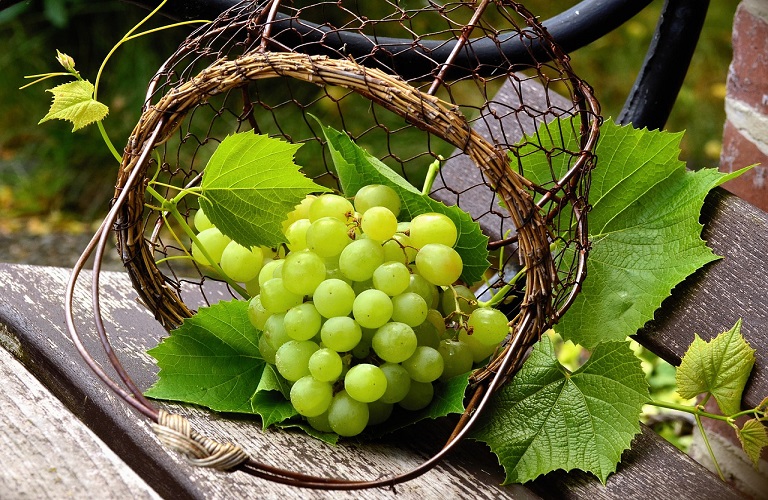
A special year with extreme weather conditions was 2021, resulting in reduced production in Greek vineyards, but with quite good quality and healthy fruit. The existence of water reserves in the soil was of catalytic importance.
This was mentioned in the Vintage Bulletin for the grapes and wines of the 2021 harvest, which was published by the Hellenic Wine Association.
According to this, the 2020 – 2021 viticultural year, which affected the 2021 harvest, showed weather extremes throughout Greece and grape production (quantitatively reduced), was affected by the two major heat waves: first in June and then towards the end. July to early August.
The first heat wave was less traumatic, leaving the vines largely unaffected. The vast majority of vineyards utilized the available water resources needed to complete the vegetation without any particular problems.
The second heatwave, however, created problems, depending of course on the variety, early or late, especially with the phase in which the plants were found. Early varieties, e.g. malagouzia and chardonnay, were further damaged, as the heat coincided with the last stages of ripening and the harvest of the fruit. Late varieties, however, such as xinomavro and moschofilero, were much less affected, especially in those cases where there were water reserves in the soil or, even better, the possibility of irrigation. Water reserves and their availability were a great comparative advantage during this viticultural year throughout Greece.
In conclusion, as the SEO points out, for this year’s harvest we could say that the saying “there’s no bad without the good” applies, since in several cases an undesirable weather phenomenon turned out, in the end, to be good. E.g. low spring temperatures may have delayed the onset of the vine germination period, but they have been protected from frost; and there were areas where real green vintage was deemed necessary to reduce the amount of production to the desired level.
The view of the Vine Institute
“In the vegetative period of 2021, intense interactions were observed between the weather conditions and the other factors that make up the terroir of the country’s vineyards. “These interactions are the result of the intense differentiation of characteristics of the Greek vineyard, such as the geographical location, the topography, the proximity to large bodies of water, the ability to store water in the soil, the plant formation system and the vine variety”, points out Dr. Dimitris Taskos, from the Institute of Agricultural Research, Department of Vine, Lykovrysi, Attica.
Studying the deviation of temperature values from the corresponding average values of thirty years and their spatial variation in Greece, for each month of 2021, a strong contrast was found: cold for the most part spring and very hot summer, with heat waves between July and August. It is noted that in a relevant bulletin of national weather service EMY, the heat wave episode of July 27 to August 5 is characterized mainly by its extended duration and, although the maximum temperature values were high, the absolute maximums were exceeded only in parts of the mainland.
Finally, “the succession of cold spring from hot summer caused a significant time shift of the vegetative stages, depending on the vine variety and the area. This shift, together with the water status of the plants, explains to a large extent the response of the vineyards to the heat waves. As a result, depending on the region, satisfactory to excellent quality is recorded, with more or less reduced production, in a year with an extremely hot summer.”
The quality of the wines
The general picture of the Greek wines of the 2021 harvest is summarized as follows:
Reds were favored more than whites, with those of some varieties, such as e.g. xinomavro and mavrodafni of Kefallinia, to be expected exceptionally and with a strong aging potential.
Wines from late grape varieties are generally expected to be better than those from early ones.
Wines from indigenous vine varieties, with better adaptation to dry weather, are more beneficial than those of other varieties.
The wines from the northern regions of the country appear beneficial in relation to those of the southerners, both of the island and of the mainland.
From an organoleptic point of view, the red wines of 2021, especially those from the later varieties, are expected to have a deep color, strong tannic profile (perhaps hard where there was excessive water stress), high alcohol content and rather moderate to low acidity. Balanced ones will have the potential of deep aging.
White wines are expected to have typical aromas for their varieties, not necessarily high-intensity, with generally moderate acidity and relatively high alcoholic strengths. With exceptions, they will be wines of immediate and medium consumption.
Latest News

Airbnb: Greece’s Short-Term Rentals Dip in March Amid Easter Shift
Data from analytics firm AirDNA shows that average occupancy for short-term rentals dropped to 45% in March, down from 49% the same month last year.

Easter Week in Greece: Holy Friday in Orthodoxy Today
At the Vespers service on Friday evening the image of Christ is removed from the Cross and wrapped in a white cloth

Meloni and Trump Meet in Washington, Vow to Strengthen Western Ties
“I am 100% sure there will be no problems reaching a deal on tariffs with the EU—none whatsoever,” Trump stressed.

ECB Cuts Interest Rates by 25 Basis Points in Expected Move
The ECB’s Governing Council opted to lower the deposit facility rate—the benchmark for signaling monetary policy direction—citing an updated assessment of inflation prospects, the dynamics of underlying inflation, and the strength of monetary policy transmission.

Current Account Deficit Fell by €573.2ml Feb. 2025: BoG
The improvement of Greece’s current account was mainly attributed to a more robust balance of goods and, to a lesser extent, an improved primary income account

Hellenic Food Authority Issues Food Safety Tips for Easter
Food safety tips on how to make sure your lamb has been properly inspected and your eggs stay fresh.

Greek Kiwifruit Exports Smash 200,000-Ton Mark, Setting New Record
According to data by the Association of Greek Fruit, Vegetable and Juice Exporters, Incofruit Hellas, between September 1, 2024, and April 17, 2025, kiwifruit exports increased by 14.2%.

Easter Tourism Boom: Greece Sees 18.3% Surge in Hotel Bookings
Among foreign markets, Israel has emerged as the biggest growth driver, with hotel bookings more than doubling—up 178.5% year-on-year.

Greece to Launch Fast-Track Tender for Offshore Hydrocarbon Exploration
Last week, Papastavrou signed the acceptance of interest for the two Cretan blocks, while similar decisions regarding the two Ionian Sea blocks were signed by his predecessor

American-Hellenic Chamber of Commerce to Open Washington D.C. Branch
AmCham's new office aims aims to deepen U.S.-Greece economic ties and promote investment and innovation between the two countries







![Πλημμύρες: Σημειώθηκαν σε επίπεδα ρεκόρ στην Ευρώπη το 2024 [γράφημα]](https://www.ot.gr/wp-content/uploads/2025/04/FLOOD_HUNGRY-90x90.jpg)




![Airbnb: Πτωτικά κινήθηκε η ζήτηση τον Μάρτιο – Τι δείχνουν τα στοιχεία [γράφημα]](https://www.ot.gr/wp-content/uploads/2024/07/airbnb-gba8e58468_1280-1-90x90.jpg)

























![Airbnb: Πτωτικά κινήθηκε η ζήτηση τον Μάρτιο – Τι δείχνουν τα στοιχεία [γράφημα]](https://www.ot.gr/wp-content/uploads/2024/07/airbnb-gba8e58468_1280-1-600x500.jpg)


 Αριθμός Πιστοποίησης
Αριθμός Πιστοποίησης